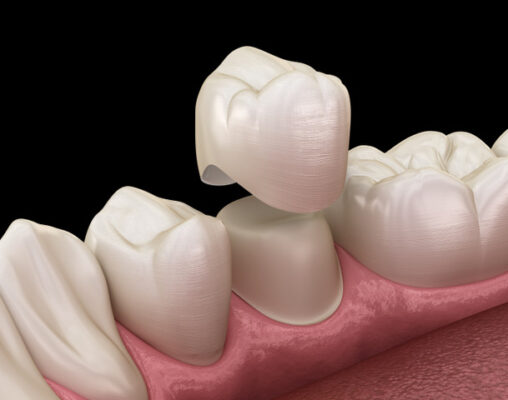
Restorative dentistry is a valuable avenue of care for patients of all ages. Accidents and other events can happen without warning, so receiving the proper treatment to help your teeth, gums, and supporting structures is crucial.
There are several different treatment options that your dentist in Millwoods can explain to you if your smile needs repair, but dental crowns are frequently regarded as the “gold standard”. Crowns are versatile meaning they can meet every patient’s needs and goals.
Contact our community dental clinic to learn more about acquiring dental crowns near you. Our staff is happy to help you out with whatever questions you may have.
Dental Crowns: What are They and How Do They Work?
A dental crown is a prosthetic that is created to slip seamlessly over the top of a damaged tooth. Impression or digital scans of your mouth are taken and sent to a laboratory, which helps the technicians to design your crown that satisfies your oral dimensions. Your tooth will be strengthened and protected from experiencing further harm.
Depending on your preferences and what your dentist advises, your dental crown can be fashioned from several materials, including:
- Metal (a combination of titanium, nickel, and chromium)
- Porcelain-fused-to-metal (PFM)
- All-ceramic or all-porcelain
- Composite resin
- Zirconia
Patients who do not want their crown to stand out should pick all-porcelain, all-ceramic, and composite resin. Not only do they mimic the appearance of your natural teeth, but they can be treated like such. However, porcelain is particularly durable and resistant to stains.
Dentists highly recommend dental crowns because of their ability to remedy several issues, such as:
- Tooth decay — For teeth that have cavities that are too large for traditional fillings, crowns are a good alternative.
- Broken teeth — Crowns function as shields for fragmented teeth, preventing further damage.
- Teeth that have a root canal — Your teeth are vulnerable after a root canal, so a crown is given is placed to help safeguard them and stop additional decay from forming.
- Misshapen teeth — Dental crowns can significantly improve the appearance of misshapen or irregular-shaped teeth, increasing the aesthetic of your entire smile.
- Dental bridges — Bridges help fill in gaps by connecting neighboring teeth. Dental crowns are used to securely anchor the prosthetic to your teeth.
- Dental implants — Like bridges, crowns can also cover implants, improving the functionality of your smile.
- A weakened tooth — A crown is a great tool when it comes to reinforcing a worn-down tooth, which allows you to bite and chew without pain.
Furthermore, dental crowns in Millwoods are also a worthwhile option if you want to fix several stained teeth, namely if your smile does not respond to whitening treatments. This is one of the best benefits of dental crowns: they simultaneously remedy cosmetic and restorative problems.
Talk to your general dentist if you’d like to gather more information about this treatment choice. They will have you come in for a consultation and evaluate your smile, allowing them to identify the best course of action for your case. If you are given the green light, they can move on to the next stage, which involves preparing your smile.
The Process: What It Entails
After your introductory session, the following steps will take place:
Treatment Plan
A tailored treatment plan is developed by your dentist, considering your needs, preferences, and the extent of the damage that your tooth has experienced. They will also let you know how many crowns you need and discuss the best material for the job.
Preparation
Impressions are made and delivered to the appropriate laboratory. A temporary crown is provided to reinforce your tooth while you wait for the permanent one to be created. This may take 2-3 weeks or so. You can also talk to your dentist about same-day dental crowns.
Placement
During a second appointment, your crown is placed over your tooth. Your dentist will make any needed adjustments before cementing it in position with special dental cement.
Final Adjustments
Your dentist will proceed to evaluate your bite pattern to see that the new crown doesn’t interfere with it and make sure it feels comfortable. Before you are free to go, they will give you aftercare instructions about how to take care of your prosthetic and increase its lifespan; this can include limiting super crunchy snacks and foods from your diet to avoid breaking the crown, attending biannual checkups and cleanings, and brushing and flossing every day.
By maintaining proper habits, your dental crown may last up to 10 or more years. Do note, however, that it is not meant to last forever; it will eventually require replacement.
Stop By or Schedule an Appointment with Agape Dental Clinic for Quality Care
Are you on the hunt for a trustworthy, dedicated dentist near you? If so, we encourage you to come by our dental practice when you can. We are passionate about dental health and will work to ensure that you achieve optimal results. Call us at 780-365-1211 or go online to schedule an appointment with our clinic.

